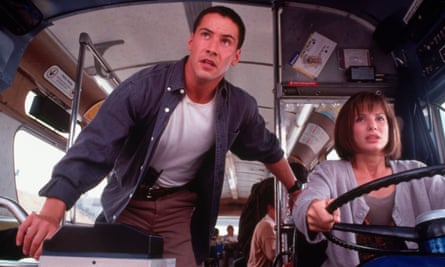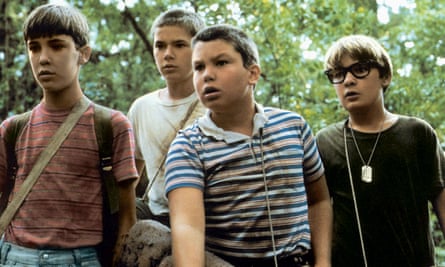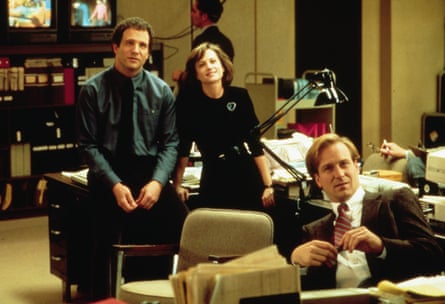Netflix
The Lobster (Ireland, UK, Greece, France, 2015) by Yorgos Lanthimos – 1 April
Though many see The Lobster as a bleak, darkly comic drama, it also has a brutally romantic core. The Greek writer-director Yorgos Lanthimos’s premise plays out with deadpan absurdity: single people must find a mate at a country hotel or be transformed into an animal of their choosing after 45 days.
Imagined in exquisite detail, every part of this scenario – governed by hotel manager/dictator Olivia Colman – amplifies today’s transactional swipe-left-swipe-right dating culture to the scale of a marriage-based dystopia, right down to the ways the hotel prisoners desperately project a shiny self-image to their potential spouses. And though the laughs are painful, even tragic, there is something genuinely touching about the bond of the fated couple, played by Colin Farrell and Rachel Weisz, clinging and resisting together until the end.
Speed (US, 1994) by Jan De Bont – 7 April

“There is a bomb on this bus.” Forget cheap nostalgia trips. As far as suspense films go, Speed has all the right genre conventions: a restricted space and a restricted timeframe, and a tonne of creative potential for exploring the possibilities of those restrictions. Then throw in a great pair of romantic heroes (Keanu Reeves and Sandra Bullock), a glorious villain (Dennis Hopper) and some keenly directed live-action stunts. Almost 25 years after its debut it might seem cliched, but Speed perfected many action-thriller conventions before they became tropes. It’s an uber-chase movie on which many others were modelled.
Honourable mentions: Matilda (film, out now), The Bourne Identity (film, 1 April), Interstellar (film, 5 April).
Stan
Stand By Me (US, 1986) by Rob Reiner – out now

Many recent titles – from Stranger Things to Ready Player One – have cashed in on the riches of 1980s pop culture, but why not skip the cheap facsimiles and go straight to the source?
In a plot that combines a search for a dead body, a parentless teenage camping trip and a lifelong trauma, Rob Reiner’s landmark coming-of-age story retains the sense of looming shadowiness so common to so many Stephen King stories, placing deep conviction in its youth protagonists (including River Phoenix, Corey Feldman and Kiefer Sutherland). When their sense of their own childhoods begins to shatter, we feel it too, and it’s that quality that makes Stand By Me a film that has resonated with so many people throughout their lives.
Philadelphia (US, 1993) by Jonathan Demme – out now
Perhaps the first mainstream US drama to acknowledge the HIV/Aids crisis, Jonathan Demme’s film remains a testament to the late director’s kind, humane approach to telling everyday people’s stories through popular cinema.
Tom Hanks stars as a man who is HIV positive, accepting the help of a homophobic lawyer for his wrongful dismissal case. It’s interesting to think about Philadelphia, dated and slightly stereotypical as it is, as a product of its time and an effort to broach a taboo subject in light of today’s cultural movement in Hollywood for diversity in storytelling.
Honourable mentions: Unreal (season three, continues with new episodes on Tuesdays), The Games (TV, out now).
Dendy Direct
Star Wars: The Last Jedi (US, 2017) by Rian Johnson – out now
There’s something inherently sad about Hollywood’s refusal to invest in new ideas, with the studios instead ploughing billions into nostalgic, cynical resuscitations of decades-dead franchises. But somehow The Last Jedi works. The writer-director Rian Johnson finds ways to extend what we already know about the Star Wars saga, bringing in fresh visual language (an abundance of beautiful, soapie close-ups of its galactic warriors) while paying homage to an onscreen world that feels deeply familiar.
As a new chapter, it’s both fresh and backwards-looking, a renovation and a pastiche. And unlike many superhero films, it makes sense at a basic narrative level, with action scenes that plug into the psychology of its characters. As long as Hollywood keeps looking towards the future of cinema through its rearview mirror, Star Wars may well be the story best suited to endless expansion.
Honourable mentions: Ingrid Goes West, Call Me By Your Name, God’s Country, Thor: Ragnarok (films, out now).
Foxtel Now
Broadcast News (US, 1987) by James L Brooks – 1 April

A classic film that mixes the rom-com formula with expert satire of US TV news and the emotionally dysfunctional, type-A misfits who work in it. The writer-director James L Brooks (The Simpsons) twists the genre even further by making us watch the female lead choose a guy who’s right for her, even though he personifies everything she stands against in her industry. Hunter’s Jane is a neurotic, brainy television reporter who begins falling for a dopey, handsome hack of an anchorman (William Hurt), while her best friend (Albert Brooks), a talented but underconfident journo, watches miserably from the sidelines. Made long before the era of fake news, yet freshly pertinent.
Honourable mentions: The Americans season six (new episodes weekly from 16 April), Say Anything … (film, 1 April), The Beguiled (film, 28 April).
ABC iView
Fabulous Creatures: Troy Emery (Australia, 2018) – out now
The artist Troy Emery and his maniac animal sculptures are the subject of this zippy, 10-minute art doco. In Emery’s artworks, the aesthetics of taxidermy combine with lurid colours and synthetic textures: the effect is of a newly evolved, bedazzled, perhaps tech-infected creature for whom something has gone very wrong. Part of a series of three docos that take us into the studios and minds of contemporary artists creating fantastical beasts.
Honourable mentions: The Checkout (new episodes on Tuesdays), The Go-Betweens: Right Here (film, until 4 April), Stargazing Live: The Milky Way (new episodes on Saturdays).
SBS On Demand
The Diary of a Teenage Girl (US, 2015) by Marielle Heller – out now until 11 April
This fine coming-of-age teen-girl drama hits all the storytelling beats you’d expect from a film of that genre but amounts to so much more. Imaginatively adapted from Phoebe Gloeckner’s graphic novel, an aspiring graphic artist (Bel Powley) in 1970s San Francisco undergoes a sexual awakening as her mother’s pathetic boyfriend (Alexander Skarsgård) embroils her in an affair. The difference is that this is a story about teen girls and women, made by women, without judgment or prudishness. Made just three years ago, it plays today like a fateful prelude to both the post-Weinstein era and Greta Gerwig’s mother-daughter gem, Lady Bird, as well as a curative to the male lens in teen cinema.
Team Hurricane (Denmark, 2017) by Annika Berg – out now
Don’t let this fly under your radar. Thirty-year-old Dane Annika Berg’s film – which just played at the Sydney Mardi Gras film festival – is an art-film rough diamond that often feels only a step or two beyond a video art piece. Following seven girls who dip in and out of a youth centre over one summer, it’s a messy, glitchy, punk, queer love letter to young women, and was formed collaboratively with its young actors.
Like a super-lo-fi, nearly plotless cousin of Lukas Moodysson’s wonderful We are the Best!, Team Hurricane innovatively captures the the millennial generation’s baroque-virtual communication style, moving away from the all-too-familiar storytelling norms of arthouse filmmaking and lapsing into pixelated, animated, emoji-laden sequences. And like The Diary of a Teenage Girl, Team Hurricane riotously discards the heteronormative values of many of its teen-girl-movie predecessors.
Toni Erdmann (Germany-Australia, 2016) by Maren Ade – out now
A black comedy, paced like an art film, with writing and performances that dig deep into the most complex and humiliating moments of parent/adult-child relationships. Maren Ade’s festival hit about a well-meaning prankster father who elbows his way back into his dour-faced daughter’s life is anchored in the squirm of observational humour, with even farther-reaching comments on the decline of Europe and the oppressiveness of corporate culture. But it’s also deeply humane with an honest, bittersweet message that avoids the corniness of many familial comedies.
Black Sea (UK, US, 2015) by Kevin Macdonald – out now
Shot in the manner of an old-school B-movie, Black Sea is a dynamite submarine thriller that could have been lifted from the cold war era, except for some decidedly 21st century themes: the shadowy excesses of globalisation and tyrannical corporate power. Jude Law leads a tattered assembly of down-and-out, depressed, emasculated working-class men who set out in a rusty Soviet sub to find Nazi riches off the Georgian coast.
Films with quasi-historical premises tend to have a strange potency – they animate what we already know about history and take us into an imaginative, yet still plausible, storyworld. Here, the notion that Hitler sent tens of millions of dollars in gold to Stalin before the violation of the non-aggression pact gives forceful resonance to a simple yet beautifully preposterous genre set-up.
Honourable mentions: Night Moves, Mustang (films, out now), Atlanta (season two, new episodes on Fridays).
DocPlay
The Look of Silence (US, 2014) by Joshua Oppenheimer – out now
With his first film, The Act of Killing, Joshua Oppenheimer – a US film-maker who has spent many years in Indonesia – broke open the documentary genre, fusing it with something much richer and more disturbing than the word “nonfiction” can summon, by stepping inside the psyches of the mass murderers who assisted President Suharto’s dictatorship from 1968 to 1998.
With this, his second film, interrogating how unpunished mass murder and the resulting trauma haunts the present, Oppenheimer shifts focus to survivors of genocide, namely a neighbourhood optometrist, Adi, who confronts the men who killed his brother. Rather than treating historical violence as a closed chapter, Oppenheimer’s films – sensitively, humanely – are moral reckonings, revealing a terrible, unresolved darkness consuming contemporary Indonesia.

Comments (…)
Sign in or create your Guardian account to join the discussion